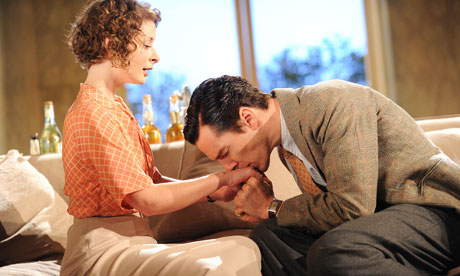Friday, 30 July 2010
Directed by Thea Sharrock
Written by Terence Rattigan
Starring Benedict Cumberbatch
Theatre Lyttleton Theatre, National Theatre
Rattigan's "lost" play After the Dance spent decades languishing in obscurity until its rediscovery in the 1990s on a BBC2 production, when it became notable for being a lost play that was actually worthy of its author's reputation.
Critics often attribute the play's lackluster original run in 1939 to its darkness, providing an unwelcome reminder of the approaching global conflict. This quite poignantly mirrors the plot of the play itself, portraying a group of Mayfair hedonists who subscribe to a life of perpetual intoxication in order to blot out the looming prospect war as well as less tolerable aspects of their own lives.
One such escapist is David Scott-Fowler, who maintains a stiff upper lip in spite of all his inner conflict and unfulfilled ambitions, even as he slowly drinks himself to death. Without giving too much away David falls in love with his younger cousin's fiance Helen, who breaks down his practiced exterior with a rare spotlight of unfettered truth. David's thoughts stray from his wife of 12 years when Helen offers him something he never even imagined possible, a second chance. But is it really a second chance, or just a new fantasy?
It seems amazing to me that this play remained hidden for as long as it did, and it provides a fascinating portrayal of this unique period in time between the wars. Rattigan disturbingly captures the dark mood of the era, so much so in fact that hit too close to home for his audience.
The acting in this play is top notch in every role. Benedict Cumberbatch is having a very good summer in the wake of his recently debuted hit TV show Sherlock, but as enjoyable as that show was I never expected him to be this good an actor. His portrayal of David seamlessly conveys both the charm of his surface bravado and the tortured empty shell beneath.
High marks also go to Nancy Carroll as David's emotionally repressed wife Joan, a seemingly jolly lush who bottles up the extent of her real feelings for her husband. Joan's tale is at times heartbreaking as realization, and inevitably regret, sets in and the cracks begin to form in her facade. Carroll does a remarkable job of conveying her character's pain through very little action at all, in contrast to the flamboyance of her regular expression.
But the most praise has to go to Adrian Scarborough as John, a leeching wastrel who lives on David's couch and sustains himself seemingly exclusively on alcohol. Scarborough serves here as a dynamo in every scene he is in, energetic and funny while slowly revealing a deep touching and touching sense of morality and insight. In classic theatrical style, the court jester is usually the wisest of all characters.
Indeed there's very little wrong with the production at all, from the beautiful set design to the astute lighting work. But one can't help but wonder when it comes to the message that Rattigan tried to convey. At times sympathetic towards these fantasists and at other times contemptuous, the play feels riddled with indecisiveness. Clearly the narrative leans more towards the latter, but then presents the realists as less than endearing. Rattigan condemns the wastrels, but does not give us an alternative. Perhaps this absence is entirely the point.



